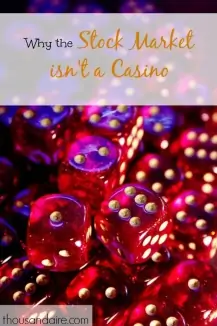The stock market is risky!

You’ve probably heard this from a dozen different people in your life. That’s because its extremely true. If you needed a way to legitimately lose your life savings in a couple days I have some bulletproof stock market strategies to recommend. The stock market is like a car, it is extremely dangerous in the hands of someone who has no idea what they’re doing, and even if you do everything right something bad can still happen and wreck your life. However, sometimes it is the only practical way to get from A to B, and after you understand what you’re doing it can substantially improve your life for the better, and its risks can be mitigated. Generally, folks are unfamiliar with how the stock market works, and understandably nervous about the concept.
The concept of a “stock” is probably an over-broad term as it is. People regularly categorize some of their investments as “stocks”. When budgeting for spending however, no one budgets a certain amount of money for “services” and a certain amount of money for “goods”. If the discussion on personal finance never got more specific than making sure that your spending allocation was your age in percentage for services and the rest on goods, I’d probably go crazy, yet people routinely recommend the same sort of breakdown for investments. A stock is a pro-rata ownership of a company.
In the US companies can own all kinds of things. Let’s take two companies that everyone is familiar with as an example, Facebook, and McDonald’s. If you told someone that you own a website that makes money from ad sales as well as the employment contracts of some of the smartest people in the world they would realize that it is very different from owning some of the best real estate in the world along with franchise agreements for a burger chain. It’s obvious in this case that owning each of these things are very different propositions, for some reason when you call them both stocks, the nuance goes out the window and all people seem to care about is that they, as Will Roger’s put it: buy some good stock, and hold it till it goes up, then sell it. If it don’t go up, don’t buy it. If you own a stock, you are part owner the underlying business. This is what separates the stock market from gambling, the owner of a stock makes money from the profits of the underlying business, and could make money even if there was no one else trading stocks. The gambler makes money only from other gamblers.
Are stocks gambling?
People like to equate any risk with gambling. They love to compare the stock market to a casino. It’s fun to compare these rich Wall Street folks with gamblers. There is one important difference, gambling is a zero-sum game. Stock ownership is a positive-sum. What’s the difference? In any gambling, for each dollar won there is a corresponding dollar lost. If you and I play poker, one of us ends the night with less money and one ends with more. We can’t both show up with $100 and both walk away with $400. that’s because when gambling you make money from other gamblers, therefore in aggregate gamblers make no money. Investors, on the contrary, make money in aggregate. The average dollar invested in the stock market earns about 10% annually.
But, but I read this book and there’s all of this fast trading…and I’m getting cheated!
Yes, there are people doing some suspicious things on the stock market, but is it going to make any difference in your returns? Not unless you trade in huge blocks of millions of dollars worth of stocks. The effect high frequency traders will tend to have on you is make your trades a couple tenths of a penny cheaper (Yay?). Let’s play with the idea a little though.
Trade less, own more
The real likely situation isn’t that you’re going to lose money to people “cheating”, but simply because you have no idea what you are doing, however, the only time someone else can get the better of you in the stock market is when you buy or sell a stock. This is also when you encounter mosts costs involved with the stock market. The broker charges you a fee, you have to pay some portion of the bid-ask spread, and you might trigger taxes. The average company in the United States makes money or expects to make money in the future, that is, after all, why they exist in the first place. Whenever you trade a stock you cost yourself some of the profits from the underlying business that the stock represents. Some of that might be from taxes, some because you’re selling too cheaply or buying too dear and the guy on the other end of the trade knows more than you. The optimal solution if you don’t think you’re the smartest guy in the stock market (you aren’t) is to buy a stock and only sell it years and years later if you need the money.
Diversify
All businesses are exposed to some kind of risk, so don’t buy just one stock, you should probably buy a bunch of different stocks. Make sure that the businesses that you own are exposed to different risks. It might make sense to own some of Apple, some Proctor and Gamble, some Exxon-Mobil, and some McDonalds. Generally the benefits of diversification tend to trail off after the first 25 stocks or so.
How not to gamble
This has left us with a couple simple rules that we could use to construct a portfolio.
- Pick 25 companies from a list of companies that you can buy on the stock market. (Maybe from this list)
- Make sure that they are in different industries, sell to different geographic areas, etc.
- Buy them every month with your investible savings.
- Don’t sell them.
If you follow these four rules I’d happily bet that you’d end up richer in ten years.
Adam Woods is a physicist. His research interests include building software to run and build geomagnetic models. Adam got interested in personal finance in the great recession when it became obvious an interest was necessary.
After harassing his friends and family (and a short intervention) he took to the web where he blogs about finance, investment, politics, and economics.
Adam is currently located in Boulder, Colorado where he can generally be found hiking, biking, or running a D&D campaign. He can also be contacted at adamwoods137@gmail.com.



I haven’t considered investing my money in any stocks but this is great information. You’ve given me a few thigs to think about when I do decide to invest in stocks
Ultimately you want to treat stocks like your money will be locked up for decades. There are a great many ways to lose all your money in the stock market. Most of them involve trading a lot or borrowing money to invest.
Buying Index mutual funds will accomplish pretty much the same thing. The question is whether you can beat the index or not, and even most pros can’t.
The problem with index funds, in my view is that while they are very good at the diversification goal, they are only pretty good at the never sell goal.
Pro’s have a very difficult time beating an index consistently, but that’s not because there’s something special about “the index” (quiz question, which index?). The “index” is just the average. The average of what? Well, because professionals make up most of the market, the average of the professionals. Naturally the average professional can’t beat the average of the professionals. That’s just a function of the way averages work. You should therefore focus on behavior which minimizes costs. Turnover in index funds is low, but why not have zero turnover?
Jeremy Siegel points out in one of his books that if you would have simply bought the companies in the S&P 500 in 1950 (with the same weighting as the index) you would have outperformed an equivalent index fund because of the additional turnover the index fund introduces due to reweighting.
A good example of the strategy I describe working out is the ING Corporate Leaders Trust. Over the last 80 years the ING Corporate Leaders Trust has outperformed the S&P 500. Why? They follow the above rules, reasonable diversification + minimal turnover.
There will be years you outperform the index, and years you underperform, but if you diversified reasonably and never ever sell chances are that you’ll come out ahead of the index over long time periods simply because your costs were the lowest.
I own index funds in my 401k type plans, and would in my 529. In my IRA, I hold individual stocks. In my taxable accounts (I know, its a great failing of mine that I’ve ended up with taxable accounts, but what can you do), I buy and intend to hold forever.
Excellent posting, RAnn asks a great question, the open question is whether its better to own individual stocks or own mutual funds.
Agreed, of course I should clarify that the consensus opinion in the PF community is probably to invest in indexes. I index substantially both because that’s my best option in those accounts and it helps hedge against the fact that I might be wrong about the best way to invest in the stock market.
I agree with the comment on index and mutual funds – historically, they seem to be the safest way to invest in the stock market. I’ve started putting more money towards that rather than individual stocks and I suspect have a balance of the two helps mitigate the risk of the individual stocks.
This is a point where I differ with the great majority of the personal finance community. This may be a case of where I’m letting the perfect be the enemy of the good, but in my view index funds are the *second* best idea when it comes to investing in the stock market. Obviously 2nd place makes it a pretty good idea, and due to the constraints backing up my 401 type accounts I own mostly index funds.
I’ll have to write a post pretty soon to clarify my reasoning regarding index funds vs individual stocks soon.
Great post, there is a big difference between gambling and the stock market. I have yet to invest beyond my company’s 401k but I know when I get to that point, my first order of business will be to further educate myself before actually investing.
Sounds like a great plan!
Great points. I know after the recession there’s a lot of people who are afraid of stock market risk, but there’s a lot of (inflation) risk in being too conservative too, and the stock market is one of the better ways of hedging against those risks. There are a lot of ways to do that, and I’m not one who wants to just hold index funds.